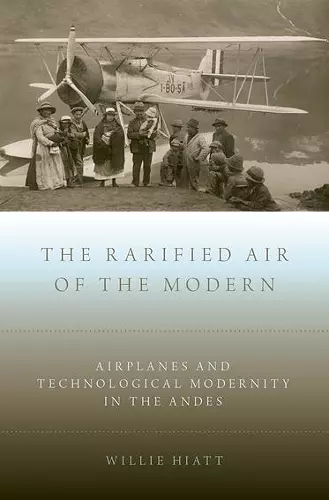The Rarified Air of the Modern
Airplanes and Technological Modernity in the Andes
Format:Hardback
Publisher:Oxford University Press Inc
Published:27th Oct '16
Currently unavailable, and unfortunately no date known when it will be back

The Rarefied Air of the Modern examines technology, modern identity, and history-making in Peru by telling the story of the surprising success of Peruvian pilots in European aviation competitions in 1910, and how their achievements generated great optimism that this new technology could lift the country out of its self-perceived backwardness. Though poor infrastructure, economic woes, a dearth of technical expertise, and a ghastly number of pilot deaths slowed the project after the first flights over Lima in 1911, the image of intrepid Peruvian pilots inspired a new sense of national possibility. Airplanes seemed to embody not just technological progress but enlightened rationality, capitalist enterprise, and nation-state aggrandizement. By 1928, three commercial lines were transporting passengers, mail, and merchandise from Lima to other parts of the country and South America. This exploration of the fitful development of Peruvian aviation illuminates how a Eurocentric modernizing vision has served as a powerful organizing force in regions with ambivalent relationships to the West. More broadly, it underscores the important role that technology plays in larger, complex historical processes. Even as politicians, businessmen, military officials, journalists, and ruling oligarchs felt a special kinship with Peru's aviation project, diverse socioeconomic groups engaged aviation to challenge power asymmetries and historical silences rooted in Peru's postcolonial past. Most observers at the time considered airplanes a "universal" technology that performed the same function in Europe, the United States, and Peru. In reality, how Peruvians mobilized and understood airplanes reflected culturally specific values and historical concerns.
...clever... * Joseph Corn, The Journal of Transport History *
delightfully written * Julio F. Carrión, Latin American Research Review *
Hiatt is consistently able to demonstrate how Peruvian elites viewed their country and their fellow citizens: alternating between hope and despair over the country's future with roughly equal measures of defeatism and unbridled enthusiasm. * Marten Brienen, European Review of Latin American and Caribbean Studies *
A very good read... This study, of how aviation enthusiasts in Peru sought to modernize their country with the flying machine, devotes a lot of space not only to the theories and practice of modernization, but also in some instances to race relations, transportation, imagination, political and economic peripheries, binaries, and, really at the core of this study, the making of Peru's national character by riding, or flying I should say, the vehicle of the airplane... This book succeeds in describing the articulation between the desires of the Peruvian elites and oligarchs to lead Peru into a new national state * L.A. Clayton, American Historical Review *
An original contributor to scholars interested in Latin American history and Science and Technology Studies (STS)... By revisiting Peruvian modernization through the lens of aviation, Hiatt brings a more nuanced view of the tumultuous path to Andean modernity while highlighting both historical episodes and actors that had been obscured by economic and political approaches. * Jose Ragas, Journal of Latin American Studies *
This intricate history of the Andes, pilots, aircrafts, entrepreneurs, elites, politicians, and ultimately the drive to develop Peru into a more modern nation is well told and well documented. Overall, this detailed and intricately woven history of personalities, politics, international relations, and technology is a strong contribution to the history of both Peru and South America ... Recommended. * A. M. Strauss, CHOICE *
ISBN: 9780190248901
Dimensions: 155mm x 236mm x 28mm
Weight: 408g
248 pages